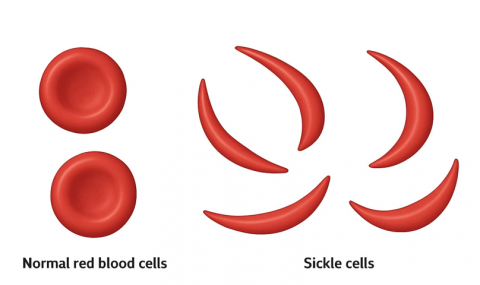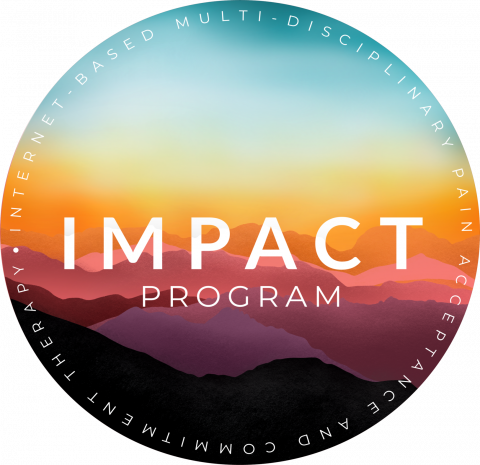Sickle Cell Disease
Sickle cell disease is a genetic condition that affects the shape of red blood cells. Normally, red blood cells are soft and round, which helps them move easily through the body and deliver oxygen.

Sickle cell disease is an inherited condition that changes the shape of red blood cells. Instead of being soft and round like healthy cells—which allows them to travel smoothly through blood vessels and carry oxygen—these cells become stiff and crescent-shaped when oxygen levels drop. This happens because a protein inside the cells, called hemoglobin S, clumps together and forms rigid structures. The misshapen cells can block small blood vessels, slowing or stopping blood flow and limiting oxygen delivery to tissues. As a result, people with sickle cell disease may experience episodes of pain, fatigue, and organ damage.
Most episodes of pain can’t be predicted. But sometimes, pain may be triggered by things like infections, dehydration, cold or windy weather, or traveling to places at high altitudes.
Sickle cell disease is more common in people of African, Mediterranean, and Middle Eastern backgrounds.
Blood transfusions may be used to treat anemia and reduce stroke risk. Pain crises are managed with medications, including pain medicines, hydration, and supportive therapies (e.g., heat, rest). If chronic pain develops, different medications can be used along with physical and psychological therapies. Regular check-ups, hydration, nutrition, and sleep are all important components of sickle cell disease management.
Pain episodes (pain crises) – Sudden pain that can occur anywhere in the body, often in the chest, arms, or legs. Pain may be mild to severe and last for hours to days.
Fatigue – Feeling very tired or weak is common due to chronic anemia (low red blood cell count).
Shortness of breath – Caused by anemia or complications affecting the lungs.
Frequent infections – SCD can affect the spleen, which helps fight infections, making individuals more prone to illnesses.
Yellowing of the skin and eyes (jaundice) – Due to the breakdown of sickled red blood cells.
Acute Chest Syndrome – A serious complication that feels like pneumonia and can include chest pain, coughing, difficulty breathing, and fever. It is a leading cause of hospitalization.
Avascular necrosis (especially in the hips and shoulders) – Reduced blood flow to bones can lead to bone damage, joint pain, and loss of movement over time.
Chronic pain – In some people, pain becomes persistent and may be related to bone or joint damage.
Delayed growth or puberty – Due to chronic anemia and nutritional demands.
Vision problems – Tiny blood vessels in the eyes may become blocked, leading to vision loss over time.
Stroke – Especially in children and young adults, due to blocked blood vessels in the brain.
Don't see what you're looking for?
We routinely add new resources to the Portal. Stay up-to-date through our monthly newsletter!
Discover Portal Services
About
Sickle cell disease is an inherited condition that changes the shape of red blood cells. Instead of being soft and round like healthy cells—which allows them to travel smoothly through blood vessels and carry oxygen—these cells become stiff and crescent-shaped when oxygen levels drop. This happens because a protein inside the cells, called hemoglobin S, clumps together and forms rigid structures. The misshapen cells can block small blood vessels, slowing or stopping blood flow and limiting oxygen delivery to tissues. As a result, people with sickle cell disease may experience episodes of pain, fatigue, and organ damage.
Most episodes of pain can’t be predicted. But sometimes, pain may be triggered by things like infections, dehydration, cold or windy weather, or traveling to places at high altitudes.
Sickle cell disease is more common in people of African, Mediterranean, and Middle Eastern backgrounds.
Blood transfusions may be used to treat anemia and reduce stroke risk. Pain crises are managed with medications, including pain medicines, hydration, and supportive therapies (e.g., heat, rest). If chronic pain develops, different medications can be used along with physical and psychological therapies. Regular check-ups, hydration, nutrition, and sleep are all important components of sickle cell disease management.
Symptoms
Pain episodes (pain crises) – Sudden pain that can occur anywhere in the body, often in the chest, arms, or legs. Pain may be mild to severe and last for hours to days.
Fatigue – Feeling very tired or weak is common due to chronic anemia (low red blood cell count).
Shortness of breath – Caused by anemia or complications affecting the lungs.
Frequent infections – SCD can affect the spleen, which helps fight infections, making individuals more prone to illnesses.
Yellowing of the skin and eyes (jaundice) – Due to the breakdown of sickled red blood cells.
Acute Chest Syndrome – A serious complication that feels like pneumonia and can include chest pain, coughing, difficulty breathing, and fever. It is a leading cause of hospitalization.
Avascular necrosis (especially in the hips and shoulders) – Reduced blood flow to bones can lead to bone damage, joint pain, and loss of movement over time.
Chronic pain – In some people, pain becomes persistent and may be related to bone or joint damage.
Delayed growth or puberty – Due to chronic anemia and nutritional demands.
Vision problems – Tiny blood vessels in the eyes may become blocked, leading to vision loss over time.
Stroke – Especially in children and young adults, due to blocked blood vessels in the brain.










